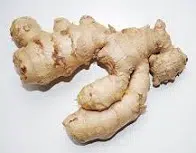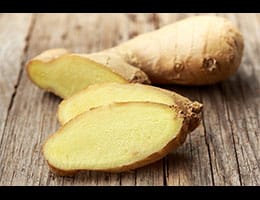 The etymological journey of ginger begins in the Sanskrit singavera , which came to Greek as zingíberis . This word, in turn, passed into Latin as zingĭber , the immediate antecedent of the word ginger.
The etymological journey of ginger begins in the Sanskrit singavera , which came to Greek as zingíberis . This word, in turn, passed into Latin as zingĭber , the immediate antecedent of the word ginger.
This is the name given to a plant that is part of the Cingiberaceae family group, belonging to the group of monocotyledonous angiosperms. Native to India, ginger - whose scientific name is Zingiber officinale - has lanceolate leaves, flowers distributed in spikes and a capsular fruit that houses many seeds.
Ginger is well known throughout the world for its rhizome (its underground stem that grows horizontally). This gnarled rhizome, yellowish and whitish on the inside, is characterized by its spicy flavor and intense aroma.
Many times the concept of ginger is used to refer to the rhizome and not to the plant in general. Its use is very widespread both in the field of gastronomy and in the field of traditional medicine .
In cooking, ginger is often used as a spice . In Western culture it is used in powder or dry form to flavor different preparations. In oriental recipes, however, the juice of the rhizome is also used.
Gingerbread is a very popular preparation at Christmas time. In this context, gingerbread men appear, cookies in the shape of a person. Another well-known product made with ginger is ginger ale , a carbonated drink that contains ginger, lemon, sugar and carbonated water.
Medicinally, ginger was used in ancient times for various purposes, including as an aphrodisiac . Currently, there are alternative therapies that recommend it to combat nausea and minimize the effects of the cold.
Let's see below a more detailed list of the benefits that ginger has for our body, both to treat certain symptoms and to prevent them:
 * As mentioned above, ginger can calm nausea. This effect is very useful for pregnant women, especially during the first months. It is worth mentioning that the baby also benefits from its properties. Nausea also appears as a consequence of chemotherapy;
* As mentioned above, ginger can calm nausea. This effect is very useful for pregnant women, especially during the first months. It is worth mentioning that the baby also benefits from its properties. Nausea also appears as a consequence of chemotherapy;
* Ginger is also suitable for treating digestive problems, such as diarrhea, gastritis and flatulence. In addition, it protects the stomach so its effect is also preventive;
* Since it is a natural anti-inflammatory, it is ideal for dealing with diseases that cause intense pain or very annoying inflammation, such as arthritis, osteoarthritis and chronic fatigue;
* One of its most common uses focuses on the treatment and prevention of throat problems, such as inflammation and infections. For this reason, professional singers love ginger;
* People who especially suffer from the cold can find ginger an ideal food to combat winter as it promotes an increase in body heat;
* to complement a weight loss diet, ginger can help speed up metabolism;
* Another of its benefits is the prevention of some heart diseases, since it collaborates with blood pumping and maintains a healthy rhythmic level;
* Similar to the previous point, ginger also improves blood circulation and this can be very beneficial for people who have problems such as their arms or legs falling asleep frequently;
* Headaches known as migraines are one of the most difficult disorders to endure. In this context, ginger can block the effects of protasgladin, a substance that causes blood vessels in the brain to become inflamed, after which migraine can appear;
* Stress is one of the evils of our times, and ginger also helps combat it.
